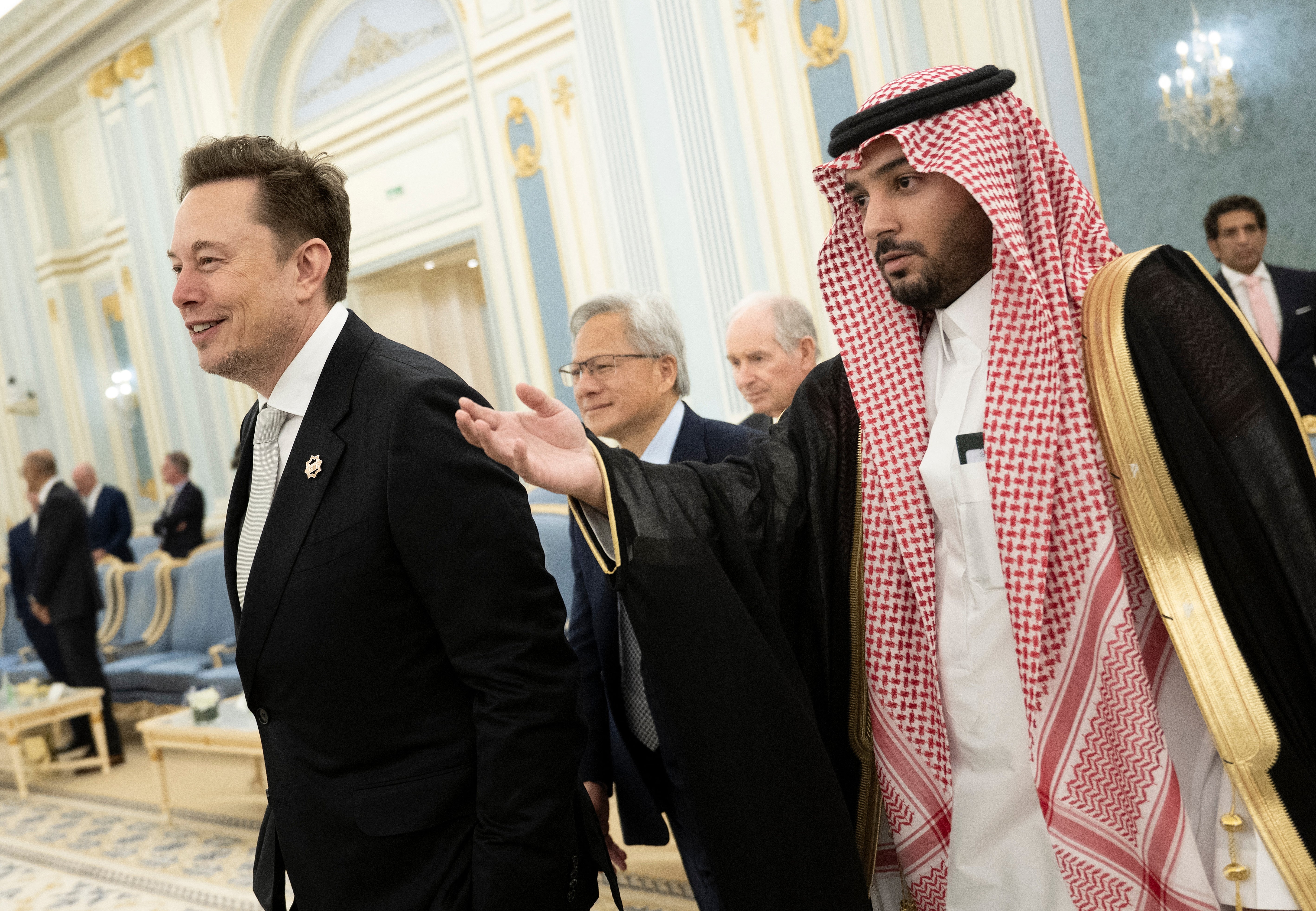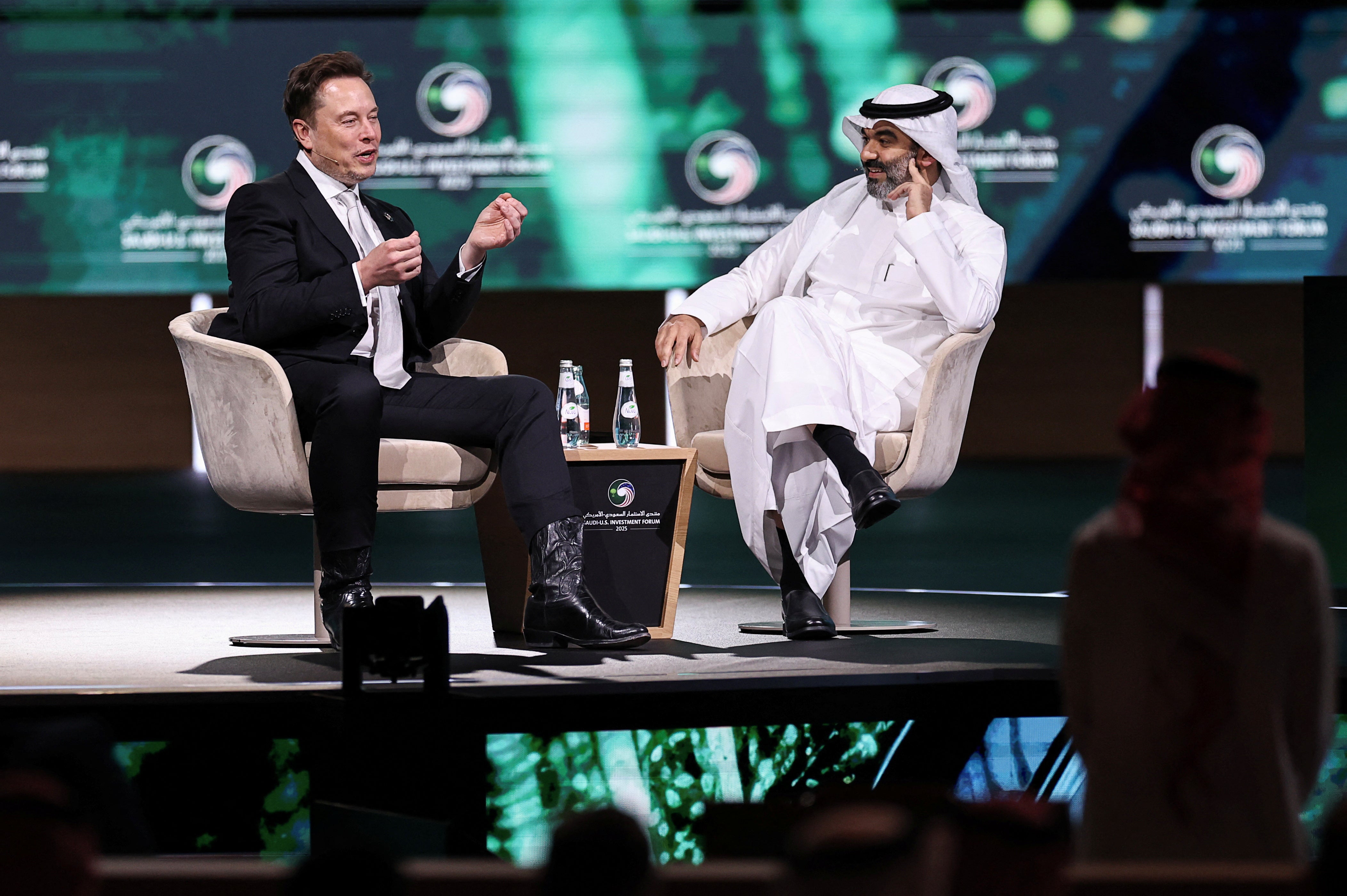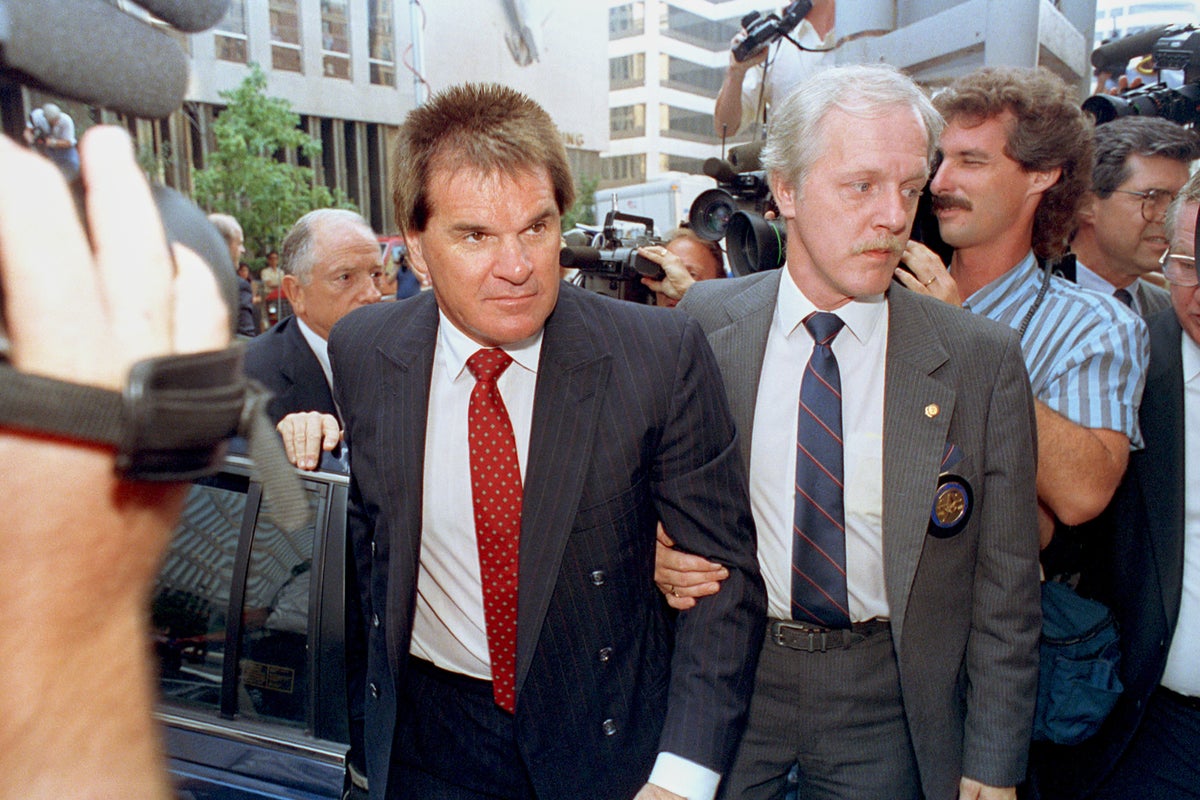ARTICLE AD BOX
An enormously wealthy team of American business executives, including Elon Musk, trailed Donald Trump on his visit to Saudi Arabia, where the president received a lavish greeting from Prince Mohammed bin Salman and a small army of royals.
While Trump shook hands inside the Royal Palace in Riyadh, American executives gathered in a nearby room under crystal chandeliers, pitching deep-pocketed Saudi businessmen to boost investments for some of the world’s biggest companies.
A handful of MAGA hats bobbed around a sea of red-and-white keffiyehs among Saudi officials, while tech CEOs sat among oil executives, bankers, private military contractors, the chiefs of Coca-Cola and Uber, and American defense contractors from Halliburton, Northrop Grumman and Boeing, among others.
The oil-rich nation has emerged as one of the biggest investors in artificial intelligence, and officials there had an audience with Musk as well as OpenAI’s Sam Altman, Google’s Ruth Porat, NVIDIA’s Jensen Huang and Amazon’s Andy Jassy, among others.
Musk — who also runs his own AI company, xAI — was joined on the trip by his brother Kimbal, who also sits on the boards of Tesla and SpaceX. Antonio Gracias, a private equity investor and Musk loyalist who joined the Trump administration as part of the so-called Department of Government Efficiency, also joined the trip.
The AI boom has sparked a rabid race for funding, and the billionaire is eager to enmesh artificial intelligence across his conglomeration of companies — and the U.S. government.

During Trump’s visit to Riyadh, the White House announced plans for the United States and Saudi Arabia to invest $600 billion in both countries, including nearly $142 billion for “state-of-the-art warfighting equipment and services from over a dozen U.S. defense firms.”
Saudi Arabia’s DataVolt plans to spend $20 billion in “AI data centers and energy infrastructure in the United States,” while “Google, DataVolt, Oracle, Salesforce, AMD, and Uber are committing to invest $80 billion in cutting-edge transformative technologies in both countries,” according to the White House.
The Saudi-U.S. Investment Forum — coinciding with Trump’s visit — also gave Saudi officials an opening to lobby the Trump administration on trade policy following the president’s tariff agenda.
A high-profile infusion of big business into the levers of political power — within a country that even the State Department warns has “significant human rights issues” — follows a trail of alleged corruption surrounding the Trump administration and his Middle East visit.
Eric Trump, who runs the Trump Organization, was recently in the region to announce a high-rise Trump hotel in Saudi and a sprawling Trump golf course in Qatar. There are other Trump projects underway in Saudi and Oman.
The president’s son-in-law Jared Kushner had previously secured a $2 billion investment from Saudi’s sovereign wealth fund, which is overseen by the crown prince himself. With that funding, Kushner launched a private equity fund after leaving the White House as an adviser to his father-in-law during his first term.
Trump, meanwhile, has scoffed at allegations of constitutional violations over Qatar’s offer to replace Air Force One with a luxury Boeing 747 jet, calling it a “great gesture” that would be “stupid” to turn down.

After deploying DOGE across the federal government to fire workers and slash budgets, Musk recently announced plans to “significantly” withdraw from the Trump administration to focus on Tesla, which saw its first quarter earnings plummet by 71 percent compared to the same time last year.
One week before Trump’s 100th day in office, the billionaire said he plans to spend less time in Washington, D.C., cutting back to only a “day or two per week.”
Musk’s position as a “special government employee” is limited to 130 days within the year. But the White House says those working hours don’t fall neatly within the calendar, and that Musk will remain a fixture within the administration, whether it’s at the White House or Mar-a-Lago.
But Musk and the U.S. DOGE Service have already amassed tools for a “sprawling domestic surveillance system“ by deploying AI across federal agencies to accelerate what critics have labelled a technocratic-driven authoritarian agenda.
While Musk and tech CEOs shake hands with oligarchs for AI funding, the Trump administration appears to be stripping away regulatory barriers for AI, including protections for intellectual property.
Trump has been a major proponent of AI. Shortly after taking office, he announced a $500 billion venture involving OpenAI, Softbank and Oracle for artificial intelligence infrastructure. But funding has reportedly hit a snag as Trump’s tariff agenda holding up financing talks.
Last month, Musk in a post on X appeared to support the idea of abolishing intellectual property laws.
And last week, the Trump administration fired the head of the Copyright Office, days after the office released a lengthy report about artificial intelligence that raised questions about the use of copyrighted materials by AI technology.
“It is surely no coincidence” Trump fired the copyright chief “after she refused to rubber-stamp Elon Musk’s efforts to mine troves of copyrighted works to train AI models,” Democratic Rep. Joe Morelle said in a statement. Morrelle and other House Democrats are calling on the inspector general at the Library of Congress to investigate.









 English (US) ·
English (US) ·